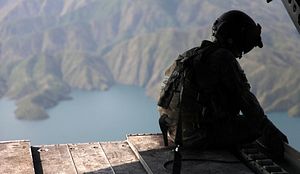The history of mutual perceptions between Pakistan and the United States has been from the very beginning defined by misunderstanding and mistrust. So far, almost every U.S. engagement with Pakistan has been issue-specific and of a tactical nature. Bilateral engagement has rarely been based on any shared perspectives and divergence of interests has mainly headlined the partnership.
At times, Pakistan has been described as Washington’s “most allied ally” in Asia; on other occasions, however, it was called the “most sanctioned ally.” While during most of the 1990s Pakistan remained buried under U.S.-imposed sanctions over a host of issues, ranging from the country’s drive to obtain nuclear weapons to its lack of democracy, there were episodes of deep collaboration when the military directly ruled the country.
Following the post- 9/11 decade, the United States’ approach toward Pakistan has effectively remained the same: Washington has continued to look at Islamabad through the prism of its own narrowly defined security interests. To enlist Pakistani cooperation, the United States regularly used threats of various kinds. In the aftermath of 9/11, U.S. President George W. Bush reportedly threatened then-Pakistani President Pervez Musharraf with bombing his country “back to the stone age” unless he supported the U.S.-led Global War on Terror.
In effect, the fundamental problem is not with Washington’s push to achieve its national security interests vis-à-vis Pakistan. The dilemma in this regard primarily exists with the question of how limited and poorly defined these interests are.
For instance, the United States’ dense military and economic engagement in Afghanistan, which surged in the wake of the Soviet Union’s invasion in 1979, abruptly vanished after the collapse of the Soviet Union, leaving behind a broken economy, a thriving jihadist network, and a disintegrated institutional infrastructure. In the aftermath of the U.S. disengagement in Afghanistan, the leadership in Pakistan, who had cooperated with Washington to prop up much of the jihadist infrastructure to curtail the Soviet Union’s advancement, had neither the resources nor the willingness to dismantle and disrupt these militant networks. The bankruptcy and collapse of Afghanistan that followed the end of U.S. combat operations in the country in 2014 was a direct result of the latter’s financial, diplomatic, and security neglect.
Arguably, had the United States remained firmly engaged in Kabul after the Soviet Union’s withdrawal from the country, it would have not only contained the ambitions of Pakistan’s policymakers but would also have greatly checked the growth of Islamist extremism, which arose in the form of the Taliban and other militant groups in the country. Inevitably – for better or worse – in the virtual absence of Washington’s presence or diplomatic foothold in the region, strategic thinking in Islamabad came down to channeling and steering these networks to suit the country’s own security interests.
Similarly, the United States has willingly overlooked other regional and local military threats that it assumes are irrelevant in its security calculus. For instance, Musharraf’s ability to keep up the juggling act between handing over number of al-Qaeda militants to U.S. and comfortably resisting action against various other Islamist groups based in the country was in a way encouraged by Washington. All of these smaller level threats, often ignored by the U.S., have come back to haunt its interests in one form or the other.
Some analysts have even argued that Pakistan’s much debated “good” and “bad” Taliban policy, to some extent, is the direct result of the country’s fears of Washington undertaking a premature and abrupt withdrawal from Afghanistan – or the region more broadly – which might create another power vacuum similar to the one created in the wake of the Soviet Union’s exit. Capturing this view, former U.S. Secretary of Defense Robert Gates said that Pakistan “maintaining contact with these groups, in my view, is a strategic hedge. They’re not sure who’s going to win in Afghanistan. They’re not sure what’s going to happen along that border area. So to a certain extent, they play both sides.”
Similarly, U.S. Senator John McCain, after visiting Pakistan recently, wrote an article in Financial Times, titled “America ignores Pakistan at its peril,” in which he argued that “For too long, the U.S. has viewed the bilateral relationship only through the prism of Afghanistan. To achieve real progress, the U.S. must make clear its enduring commitment to Pakistan’s stability and economic growth.”
U.S. collaboration with Pakistan has hardly extended beyond the realm of security, where Islamabad was either offered an alliance or forced into one. Mainly due to this approach, policymakers in Islamabad have never felt fully confident in this union. In order to fulfill its own larger economic and security needs, Pakistan, therefore, has looked for other sources and support, whether conventional or non-conventional. Arguably, Islamabad’s strategic tilt away from Washington and toward Beijing is meant to countervail the United States’ highly demanding partnership in the region, particularly in Afghanistan, where China’s involvement has increased to unprecedented levels recently.
To build trust therefore, the United States needs to expand its partnership with Pakistan beyond the security prism, something Islamabad has always requested. “It has been our experience that as soon as the U.S. achieves its [security] objectives vis-à-vis Pakistan, it loses interest in cooperating with us,” said Shamshad Ahmad, Pakistan’s former ambassador to the United Nations.
Pakistan, for its part, needs to equally demonstrate that it’s ready and willing to take on all terrorist groups, something that the U.S has always asked for. Islamabad has lately claimed to have taken on this task in its recent counterterrorism efforts through the National Action Plan (NAP).
The current U.S. approach of limiting its partnership with Pakistan to security matters doesn’t in any way serve Washington’s interests in the long term. Offering Pakistan better trade and economic partnerships, understanding its security concerns in relation to its neighbors, and taking steps to strengthen the country’s democracy can go a long way toward diminishing the overwhelming trust deficit and establishing a positive U.S.-Pakistan relationship.
































